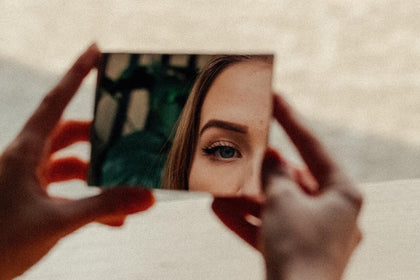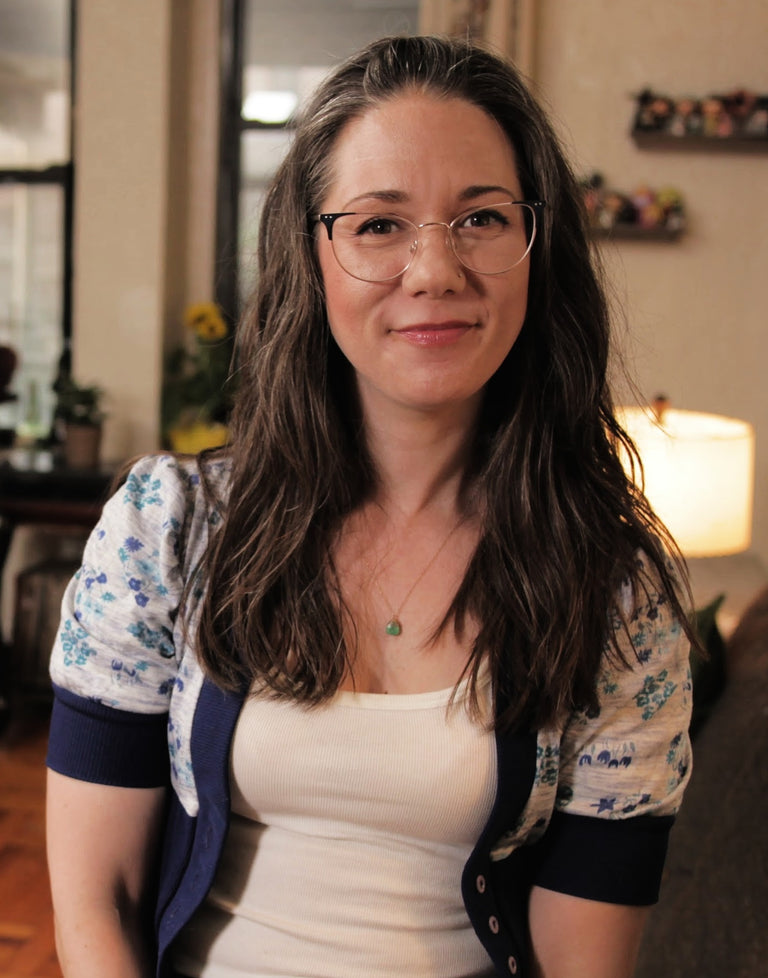Hair loss has many possible causes, ranging from underlying health conditions to medications, genetics, sudden bouts of stress or even hair care and styling practices. But no matter the cause, hair loss can cause major rifts in our sense of self and our emotional well-being.
Read on to understand how hair loss might affect you, along with insight from experts on how to cope with the emotional challenges of hair loss and tips you can use to help support hair wellness from the inside and out.
#include-related-slider#
The Complicated & Challenging Emotions Related to Hair Loss
Why is hair loss so damn hard? Perhaps the biggest emotional challenges that stem from hair loss come from our cultural values around it. For many, across different cultures and societies, luxurious hair has been associated with youth, attractiveness, health and vitality. A person’s hair can signify much deeper meanings, too, around cultural identity, politics and even faith. As human beings, our relationship to hair is complex!
So when we lose hair, it can bring up a lot of complicated and challenging emotions.
Nataly Kharkina, founder of Green Baby World, had to face these challenges head-on when she experienced significant postpartum hair loss. “When you wake up and see a carpet of your hair that has fallen out overnight, it significantly affects your mental and emotional health,” she said.
Postpartum hair loss is very common, affecting about 50% of women who give birth. That said, the mental and emotional struggles around hair loss affect everyone, and it’s important to remember that you’re not alone in these struggles.
Cadyn Cathers is a doctor of psychology and licensed therapist with The Affirmative Couch, a committed advocate for the mental health of LGBTQIA+ communities. In his practice, Cadyn often works with hair loss and its emotional consequences.
“Hair loss in transgender women can be particularly devastating since hair can be a social gender marker,” he shared. “In other words, there isn't only the internal distress that their hair isn't what they wish it would be, but also that others may misgender them, react negatively or even aggressively.”
According to Alissa Schneider, a Licensed mental health counselor with Sunshine Psychological Therapy who has had her own struggles with hair loss related to an autoimmune disease, the difficult emotions that might come along with it can run a pretty wide gamut.
“A person struggling with hair loss may deal with a whole host of difficult emotions and inner experiences such as anxiety, a compulsive desire to attempt to fix the hair loss or to find solutions, poor self-image and questioning their sense of identity,” she said.
Crippling depression, fears around being judged, social avoidance and paranoia are other heavy internal struggles you might face when dealing with hair loss. Each person’s emotional and mental struggles around hair loss will be unique to them, but no matter what you might face, know that these feelings are completely normal and totally OK.
“Living with hair loss is not easy. In fact, it is an emotional roller-coaster ride. Some days you’re up, some days you’re down, and other days, a lot of twists and turns,” said Tonya Renada Moore, a woman who has turned her own struggles with alopecia areata into a career advocating for women who are experiencing hair loss.
It’s also important to point out that hair loss is just that — a loss. And it can be a major one. “Hair loss is also about loss in a larger sense — the perceived loss of attractiveness, loss of desirability and it may even trigger other feelings of anxiety or depression related to loss in other areas of your life,” said Dr. Stanley Teitelbaum, a clinical psychologist practicing in New York and New Jersey.
In addition to the many other emotional challenges that can come up around hair loss, you might also experience grief that’s on par with the grief you might experience when losing a loved one, a relationship or a job.
“I truly believe it’s just like dealing with the death of a loved one, and it takes time to get through the various stages of grief around losing one's hair and self-image,” added Tracy Chamberlain Higginbotham, an inspirational speaker and author who lives with alopecia.
There’s no doubt that the emotional side of hair loss is real and raw. So what are some ways you can manage these struggles in a self-compassionate, proactive and healthy way? Read on to find out.
Explore: GRO Hair Products for Thicker, Fuller Looking Hair
Reframe Your Self Worth
It is common and completely normal for hair loss to affect core feelings around self-worth because many of us live in cultures and societies that place a lot of importance on physical appearance. And while there is nothing wrong with wanting to look and feel our best, if your feelings of self-worth are being impacted by the loss, it might be helpful to shift your perspective inward.
“Instead of focusing so much on physical appearance, recognize that you are of value, and this has nothing to do with how you look or how much hair is on your head,” said Schneider. If you strip away the part of your identity that is purely physical, what’s left? Who are you underneath your physical appearance? What values, qualities and character traits are unique to and important to you?
“Is it your relationships, meaningful work or volunteer work, spirituality, caring for nature, educating others or something else? These are the things that also make up your identity, not solely your appearance.
“It is a slow go — but a positive one — if we realize our beauty lies within us,” said Chamberlain Higginbotham.
Seek Therapy
Hair loss can feel very isolating, especially if you’re feeling hesitant to go out and be social because of your appearance. But it’s important to remember you’re not alone. According to the American Academy of Dermatology Association, at least 80 million Americans are experiencing some form of hair loss.
If your feelings around hair loss feel intrusive, unmanageable or are impacting your day-to-day life, a trained therapist can be a wonderful resource to help you navigate this challenge. “Working with a therapist to address body-image concerns or anxiety related to your health can be really powerful,” said Schneider.
A mental health professional not only can help you make sense of and work through the different emotions around your loss while in session but also offer tools that you can use outside of therapy to manage the day-to-day challenges that may come up.
Attend Support Groups
It bears repeating: You are not alone in facing the emotional and mental challenges around hair loss. There are many hair loss support groups available where you might find comfort and inspiration from others facing the same challenges you are.
Tonya Renada Moore started the Facebook group “Wearing Alopecia With Style” for people managing all forms of hair loss. “I realized that sharing my alopecia journey was helping other women heal and become comfortable in their own skin,” she explained.
VEGAMOUR has also grown a thriving community of thousands of women who are facing hair loss and actively working toward hair wellness, and The Alopecia Support group offers resources on its website along with a Facebook community. Additionally, the National Alopecia Areata Foundation has its own support group.
Aside from these, there may be local support groups that are specific to your hair loss condition.
Educate Yourself
Knowledge is power, which is why a thorough understanding of the cause of your hair loss can be not only empowering but also offer practical ways to manage your specific hair loss concerns.
“Get yourself educated,” advised Scott Bryson, a man who is managing hereditary pattern baldness. Also known as androgenetic alopecia, pattern balding is a hair loss condition that impacts both men and women. “Seek out thoroughly reputable sources of information that will keep you moving forward. Look for impartial information about your hair loss condition, treatments and products, along with the latest news,” he added.
While your hair loss might be permanent, understanding the hows and whys of the underlying cause will help you manage expectations and devise a game plan for moving forward. And the outlook is positive. More and more research is focusing on a wide variety of hair loss conditions, while innovations in treatment continue to emerge.
Consider Options for Enhancing Your Appearance & Building Self-Confidence
In addition to seeking out support through therapy, support groups or education, another way you might empower yourself in managing hair loss is by investigating the ways you can approach your physical appearance and increase your self-confidence.
Some women benefit from being seen without a wig or hair covering and find empowerment in owning their appearance just as it is. Others will find empowerment by adding head coverings or wigs to their wardrobes or opting for a new hairstyle. There are so many great options available! Between head coverings, wigs and creative hairstylists, you might be able to develop a new look you totally love.
“At age 54, I decided I was not going to attempt to regrow my hair any longer,” said Renada Moore. “I’d had enough and asked my husband to help me shave it all off.”
Moore was able to find a new signature style that has become part of her personal brand.
“I started wearing my signature “anytime, anyplace” headwrap style everywhere. Even if people don't know my name, they recognize me as the lady who wears the colorful headwraps,” she added.
Ultimately, it’s about being true to your own feelings and doing what will make you feel most comfortable and satisfied.
Be Gentle With Your Hair
Another great way to approach your hair loss is to add some serious TLC to your hair care routine. Being gentle on all fronts — from careful brushing and combing to using toxin-free products designed to encourage thicker looking hair — will help give your follicles the support they need. Other ways to give your scalp’s ecosystem a break are to avoid tight hairstyles, heat styling and chemical treatments.
Focus on Nutrition
Adding healthy practices to your toolkit offers triple the benefits, as it will support not only your overall physical well-being but your mental health and hair health, too.
A well-balanced and varied diet is a simple way to provide your body with what it needs for hair and mental health. Proteins are the building blocks for hair, so making sure that you’re getting adequate amounts is a great way to support follicles. Other vitamins and minerals essential to hair health, like vitamins A, B-7, C and E, along with minerals like zinc and iron, are relatively easy to get when you eat a wide variety of healthy foods. Also consider a hair supplement to give your diet an extra boost and fill in the gaps.
Manage Stress Levels
Actively managing stress is another great tool in a toolkit for holistic health. It’s no secret that stress, when left unchecked, can wreak havoc on our emotional, mental and physical well-being. Stress also has very real impacts on your hair. Luckily, there are lots of options for managing stress and decreasing its negative impact. Think exercise, yoga, meditation, spending time in nature or even having a good laugh. These are all science-backed ways to relieve stress and soothe the body.
Related: Take the Hair Quiz to Find a Custom Hair Routine
Get Plenty of Sleep
And finally, getting adequate rest is essential. Sleep offers the body a time to reset, restore and heal. Plus, it supports healthy immune and brain function, clear skin, improved energy levels and, yes, hair wellness.
#include-related-slider#
The Takeaway
Hair loss can be an extremely difficult experience that has ripple effects on our mental, emotional and physical well-being. The feelings that come up around hair loss can be quite complex and far-reaching, but know that you are never alone in this experience. Tens of millions of Americans are dealing with various forms of hair loss. Being gentle with yourself, seeking professional support and taking care of your mental and physical health are all tools you can reach for if you need help navigating this challenge.
More From VEGAMOUR
- What Causes Sudden Hair Loss?
- How Often Should You Wash Thinning Hair?
- Causes of Hair Loss in Women
- 5 Signs You Should See a Doctor About Your Hair Loss
Photo credit: Dimitry Zub/Pexels
Back


















